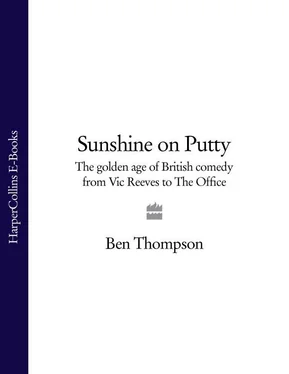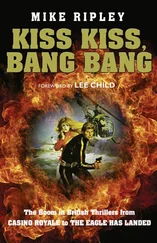This was one strange cultural linkage which somehow escaped the all-seeing eye of Greil Marcus. Marcus’s landmark 1989 volume Lipstick Traces3 sought to clear away the soil from the roots of punk rock by making ingenious connections between obscure sixteenth-century Dutch heretics and members of the Sex Pistols who happened to have similar names. Within the shared cultures of appreciation which have grown up around pop music (or film, or literature, come to that), such extravagant intellectual conceits are, if not exactly ten-a-penny, certainly far from unheard of. Yet British comedy’s ever-increasing cultural prominence has so far proved resistant to such ambitious interpretations.
One of the main aims of the book you currently hold in your hands is to stop people wondering why no one has ever attempted something similar in the entertainment field which Jethro and Ken Dodd call home. But before we can begin to see if this lofty goal can be achieved, two important questions must be answered.
1. Was the Reeves/ Office era really a golden age, and if so, how and why did it come about and what were its exact parameters?
In years to come, the old folk will gather at the seaside. As the coastal waters lap ever closer to the top of the Thames Barrier, the veined and the venerable may be seen pottering up and down the promenade, lost in heated debate about the glory days of their youth.
‘Ah yes,’ one of them will say, sucking meditatively on an olde-English Alcopop drink, ‘the early to mid-1990s: The Day Today, Alan Partridge, Shooting Stars, Paul Calf, The Fast Show, Father Ted… Never again would we have it so good: the attention to detail, the mordant wit: why did those great days ever have to end?’
A contemptuous expostulation from a nearby bench might upgrade this nostalgic monologue into a vicious row. ‘But what of the magical autumn of 2002 – with the third series of The League of Gentlemen, and the second of The Office, I’m Alan Partridge and Phoenix Nights… ? Surely this was a vintage the like of which would never be equalled?’
Learned observers of this rose-tinted spectacle might quote Sigmund Freud to the effect that comedy itself is a form of nostalgia, as it attempts to ‘recapture the state of childhood in which we did not know the comic, were incapable of wit and did not need humour to make us happy’. 4Sceptics of a more populist bent will no doubt cite the number of people who used to watch The Morecambe and Wise Christmas Special as evidence of a narrowing of both the focus and the range of British comedy in the aftermath of the 1970s heyday of what dewy-eyed nostalgia fiends of an earlier generation like to call ‘One Nation TV’.
Both parties will have a point.
And yet the bald facts of the situation are these. First, that the period which authoritative historical evidence set out in the following pages will prove started with Vic Reeves5 Big Night Out was one wherein comedy and comedians had an unprecedented impact on this nation’s intellectual and emotional life. Secondly, that – without surrendering entirely to the mania for pointless list-making which is the symptom of a culture on the brink of nervous collapse – it would be fair to say that the best ten British TV comedy shows of this era (the other nine being The Day Today, Father Ted, The Fast Show, Shooting Stars, Brass Eye, I’m Alan Partridge, The Royle Family, The League of Gentlemen and The Office .. , with Spaced, Black Books, the funny bits in Smack the Pony, the first series of Big Train and the great lost Paramount Channel sketch series Unnatural Acts pressing hard on their heels, since you asked) not only stand comparison with, but actually overshadow the small-screen landmarks of any previous era.
Far from merely echoing such past glories as Fawlty Towers or That Was The Week That Was, the finest moments of late twentieth-and very early twenty-first-century UK comedy actually represent a worthy culmination of everything that had happened in the preceding fifty years. Not just in terms of evolving comic traditions – from Hancock to Steptoe to The Royle Family; or Spike Milligan to Monty Python to Eddie Izzard – but also with regard to the changing character of the broader culture from which those traditions have emerged.
In the more distant past, it has been possible for astute commentators to discern precise causes of particularly successful periods of comedic endeavour. For example, the golden age of Wilde and Whistler could be ascribed to the healthy state of a late-Victorian Fleet Street which, then still some way short of becoming – in the eloquent estimation of D. B. Wyndham Lewis 6– ‘the sedulous ape of New York tabloidery’, none the less ‘recognised the existence of a small, cultivated, leisured evening newspaper public and strove to meet its taste’. And the aura of celebrity which enveloped the notoriously sharp and combative wit of Alexander Pope in the early 1820s was the product (in the memorable estimation of Dilys Powell) 7not only of the cessation of press censorship but also of ‘a time when the exercise of critical reason was as much applauded as today the eye of a Bradman or the punch of a Louis’. 8
Turning to our own mirthful epoch in search of similarly clearsighted explication, readers of Michael Bracewell’s generally estimable The Nineties: When Surface Was Depth will have had to be satisfied with a rather downbeat theory of causation. ‘The country was still watery-eyed and winded’, apparently (and therefore, presumably, in dire need of a good laugh), ‘from being punched below the intellect by the recession of the late eighties.’
Other, somewhat more specific, economic factors suggest themselves. Without diving too deeply at this early stage into the sewage-encrusted gravel pit of media politics, it would be fair to say that the rise of independent production companies in the mid to late 1980s – set in train by changes in the remit of the BBC and the advent of Channel 4 – was a vital precursor to the explosion of comedic creativity in the next decade. The break-up of the mass TV audience with the dawn of the digital era was another essential precondition.
Where comic performers of earlier times might have had to hold on to an eight-figure following to be considered a viable star of the small screen, it was now possible—by the magic of advertisers’ demographics and Friday-night channel-branding entertainment packages – to sustain a major TV career on the basis of an audience of two million.
The expansion of creative extremity and fearlessness thus facilitated would stand a new comedic epoch in good stead. But what were the conditions for membership of this new generation, and how – and against what – would it come to define itself?
The preceding, ‘alternative’ era had kicked off in headily coincidental and clear-cut style, as the opening of former insurance salesman Paul Rosengard’s Soho Comedy Store synchronized helpfully with Margaret Thatcher coming to power. (At the start of William Cook’s 1994 book Ha Bloody Ha: Comedians Talking, it is even suggested – somewhat controversially – that the former of these two historical events might have been of more lasting historical significance.)
The start of the generation currently under consideration is a slightly more staggered affair – less a clean break and more a jagged edge. Paul Whitehouse is part of it, but Harry Enfield isn’t. 9Ben Elton isn’t allowed within sniffing distance, but his erstwhile Friday Night Live colleague Jo Brand is (or was, until she started presenting lame late-night advert-clip TV shows). Patrick Marber, whose late-eighties stand-up persona gave no signal of the sophistication of his later work on The Day Today and Knowing Me Knowing You, With Alan Partridge (let alone his subsequent career as an internationally acclaimed playwright), is definitely included, yet Jennifer Saunders – for all the great leap forward into modernity represented by Absolutely Fabulous – for some reason isn’t.
Читать дальше












